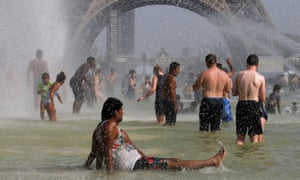Findings confirm 11 of the 12 warmest years in Europe occurred in past two decades
Europe
had its hottest year on record last year, new data has confirmed, with
periods of exceptional heat last February, June and July, and one of the
wettest Novembers on record.
Previous records were broken by only a small margin, but the findings confirmed that 11 out of the 12 warmest years in Europe have occurred in the past two decades, according to the European State of the Climate 2019 report, published on Wednesday.
There was drought in central Europe over the summer, but at the end of 2019 four times the normal amount of rain fell in western and southern Europe.
A heatwave in Greenland last year brought record levels of surface melting, the report found, though the European Arctic was slightly colder across the year than in some other recent years, with the lowest average since 2010. Europe’s glaciers have lost an average of 16 tonnes of fresh water per square metre since 1997.
Summer temperatures in parts of Europe were as much as 3C to 4C higher than normal in 2019, the report said, with heatwaves in June and July breaking records in France and Germany.
The data confirms other findings that show a clearly warming trend
globally. The World Meteorological Organisation (WMO) also produced its
final report for 2019, confirming that last year was globally the second hottest on record, with the oceans reaching the highest temperatures ever recorded.
Petteri Taalas, secretary-general of the WMO, said that although the
coronavirus crisis would probably result in a temporary drop in
greenhouse gas emissions, it would also make it harder to help people
afflicted by the impact of climate breakdown. He warned that ignoring
the climate crisis would have a greater impact than the pandemic.Previous records were broken by only a small margin, but the findings confirmed that 11 out of the 12 warmest years in Europe have occurred in the past two decades, according to the European State of the Climate 2019 report, published on Wednesday.
There was drought in central Europe over the summer, but at the end of 2019 four times the normal amount of rain fell in western and southern Europe.
A heatwave in Greenland last year brought record levels of surface melting, the report found, though the European Arctic was slightly colder across the year than in some other recent years, with the lowest average since 2010. Europe’s glaciers have lost an average of 16 tonnes of fresh water per square metre since 1997.
Summer temperatures in parts of Europe were as much as 3C to 4C higher than normal in 2019, the report said, with heatwaves in June and July breaking records in France and Germany.
“Whilst Covid-19 has caused a severe international health and economic crisis, failure to tackle climate change may threaten human wellbeing, ecosystems and economies for centuries,” he said. “We need to flatten both the pandemic and climate change curves. We need to show the same determination and unity against climate change as against Covid-19. We need to act together in the interests of the health and welfare of humanity, not just for the coming weeks and months but for many generations ahead.”
Globally, the past five-year mean temperatures were 1.1C above pre-industrial levels, taking the world closer to the 2C threshold, beyond which scientists say climate breakdown is likely to become catastrophic and irreversible. All countries are bound by the Paris agreement to hold global heating rises to no more than 2C, though the US is withdrawing from the accord.
Carlo Buontempo, director of the Copernicus Climate Change Service, which compiled the European State of the Climate 2019 report, on behalf of the European Commission, said: “One exceptional warm year does not constitute a warming trend, but with detailed information from our operational services, that covers many different aspects of our climate, we are able to connect the dots to learn more about how it is changing.”
The reports were published to mark the 50th anniversary of Earth Day, which is being celebrated online around the world.

No comments:
Post a Comment